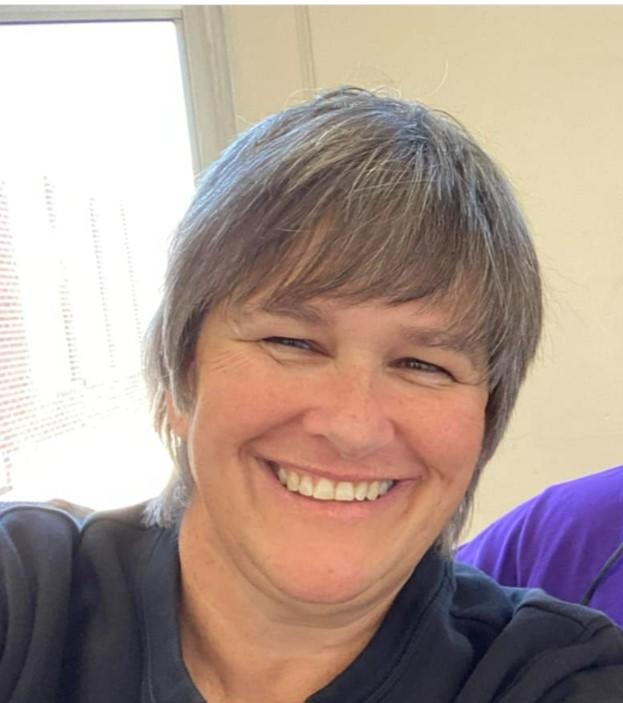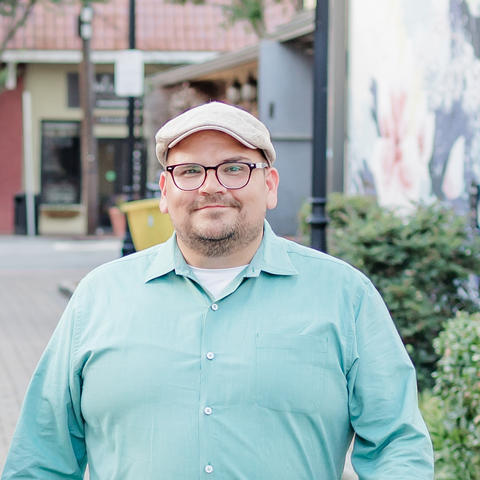
Section Branding
Header Content
Georgia Today: 'Cop City' agreement; superintendent quits after anti-gay letter; gas, egg prices up
Primary Content
LISTEN: On the Tuesday Jan. 31 edition of Georgia Today: Atlanta and DeKalb County have an agreement on 'Cop City,' a south Georgia superintendent quits after an anti-gay letter circulates, and gas and egg prices are up.

Peter Biello: Welcome to the Georgia Today podcast from GPB News. Today is Tuesday, Jan. 31. I'm Peter Biello. On today's episode: An anti-gay letter led to a South Georgia superintendent's resignation — but the community wants her back; the price of gas and the price of eggs rise; and a new documentary looks at the complicated history of Stone Mountain. These stories and more are coming up on this edition of Georgia Today.
Story 1
Peter Biello: The leaders of Atlanta and DeKalb County have reached an agreement over the planned law enforcement training center that has sparked years of protests over greenspace, policing and other issues. Atlanta Mayor Andre Dickens this afternoon outlined the agreement, which he said will protect and enhance the surrounding environment and spur local business and job development in this sound from 11Alive.
Mayor Andre Dickens: And we're here taking the recommendations to add a 100-foot tree buffer, their recommendations to add sidewalks, their recommendations to have the firing range move further away from the residential area.
Peter Biello: The agreement clears the way for construction permits. Protests over the facility led to a confrontation that killed a protester and injured a state trooper two weeks ago. We'll have more on the story tomorrow on the podcast.

Story 2
Peter Biello: Georgia LGBTQ advocates are applauding the show of support for a South Georgia school administrator who resigned after someone circulated an anti-gay note about her to local pastors. Beth McIntyre is a blueberry farmer in the area. She says she has known Bell Hill County Interim School Superintendent Dawn Clements since Clements was a child. McIntyre says she was not surprised when hundreds showed up to support her at a Saturday meeting when the school board rejected her resignation.
Beth McIntyre: When something that hateful and mean-spirited is written about our people, we don't like it. It was uncalled for. The best thing to me that we can do to overcome that is for her to be our superintendent and move right on.
Peter Biello: McIntyre called Clements an outstanding administrator and believes stress from the letter led to her resignation. Her supporters hope Clements will return.
Story 3
Peter Biello: Gas prices continue to rise. The average price of a gallon of regular unleaded in Georgia is $3.38, up from 8 cents a week ago. That's according to triple A, and that's also up 63 cents from a month ago before the state resumed the gas tax, which had been suspended for most of last year. A spokesperson says the rise in crude oil prices is to blame for the higher gas prices nationwide, which is an average of $3.50.

Story 4
Peter Biello: Consumers are feeling the squeeze of higher prices at the supermarket, especially for eggs. December egg prices nationally averaged around five bucks a dozen or more than 200% more than a year ago. But Georgia egg producers say a lot of their newfound profit is being eaten up with expenses. The cost to feed and house egg-laying chickens is going up. Todd Applegate leads the University of Georgia Department of Poultry Science.
Todd Applegate: We've seen a transition over the past six, eight-plus years to have more of our flocks reared in that cage-free environment. But it does take 2 to 3 times the amount of cost.
Peter Biello: Applegate says Georgia managed to avoid much of the avian flu outbreak that killed flocks last year, but it remains a wildcard for the spring. He says on any given day, Georgia produces more than 7 million eggs.
Story 5
Peter Biello: University of Georgia researchers are working to develop a market for jellyfish proteins. GPB's Orlando Montoya reports the goal is to help the state's struggling seafood harvesters.
Orlando Montoya: Cannonball jellyfish or jelly balls are abundant off Georgia's coast, but right now there is really only one commercial use for them: crunchy, dried and salted. Plus, a trade war with China halted exports years ago. Now UGA food science doctoral candidate Peter Chiarelli is leading research aimed at using jellyfish collagen proteins for other applications.
Peter Chiarelli: So you can go into the food industry and sell it as a food ingredient or a food supplement. Maybe you can make a gelatin and use that in different types of dessert products. You can also use it in soups and stews. And yes, there's a huge industry right now for cosmetics.
Orlando Montoya: Chiarelli says one hurdle to the research is actually getting the jelly balls, which fetch a low price for harvesters. For GPB News, I'm Orlando Montoya.
Story 6
Peter Biello: Atlanta will host an inaugural track and field event that organizers are comparing to those held during the 1996 Olympic Games. The Atlanta Track Club says the Adidas Atlanta City Games will take place on May 6 in the city's Centennial Olympic Park. The free event is expected to feature numerous professional athletes, including three-time world champion and Olympic bronze medalist Noah Lyles, who was on hand to announce the event. He will also include a running competition open to the public.

Story 7
Peter Biello: State lawmakers have introduced a bill to regulate the third-party food delivery industry in Georgia. Food delivery apps like Uber Eats and DoorDash grew so rapidly during the pandemic that health regulators couldn't catch up, resulting in complaints from restaurants and customers. Atlanta state senator Democrat Elena Parent says her bill would prohibit third party food companies from advertising non-existent connections with restaurants. It also would require vehicles to be clean. No smoking or vaping would be allowed inside delivery vehicles and pets that aren't service animals would be prohibited. Food containers delivered by a third party would have to be closed, sealed and tamper resistant and thermal containers would need to keep food at the proper temperature. Her bill has several co-sponsors from both major parties.

Story 8
Peter Biello: Stone Mountain is home to the largest Confederate monument in the world. It features carvings of three prominent leaders of the Confederacy. To some, it's a monument to Southern heritage. But to others, it's a painful reminder of the South's effort to hold on to slavery and the oppression of Black Americans. A new documentary from the Atlanta History Center highlights both views, but with an emphasis on remembering Stone Mountain's difficult past and present. It's called Monument The Untold Story of Stone Mountain. Kristian Weatherspoon is vice president of digital storytelling at the Atlanta History Center, and she's with me now.
Kristian Weatherspoon: Thanks, Peter, for having me. Great to be here.
Peter Biello: What did you think was missing from the stories that have been told about Stone Mountain over the years?
Kristian Weatherspoon: I mean, yeah, I mean — a bit of context, you know, about myself: I am a Southerner, born and raised Mississippian. As a Southerner, I really thought that the voices of Southern people was really missing in the conversation. I mean, obviously, this is a hot-button issue at a national level that has been happening for a while. And so kind of from the coverage and just the exploration that I'd seen, I thought like, wow, this issue is it's certainly an issue, but it's something that really plays a little bit differently in the south, in place, in this place, like where you grow up with it. You know, many of us are steeped in it. And so I think that is the reason that all of the voices that you hear in the film, you know, the majority of the voices, I should say, are from the South and they are from Georgia, really specifically.
Peter Biello: One of the things that I thought was really interesting about Stone Mountain and some of the things the scholars in this documentary said was that it is it's almost less about the Civil War than it is about the civil rights movement of the 20th century. Can you talk a little bit about that?
Kristian Weatherspoon: Yeah, for sure. I mean, it was, I think, it's — again, the title kind of alludes to, you know, this untold history. And, I mean, we know that these are things that happened, you know, this is history that's kind of been around. But a goal for us was to have packaged all this history in one place for people to see. And honestly, for people to connect dots. And that is one important to connect is that know the final carving effort was initiated by a segregationist governor who you hear from in the film, Marvin Griffin, just 57 days after the Brown v. Board of Education decision.
Peter Biello: That's the one that desegregated schools.
Kristian Weatherspoon: Yes. And so that is that in itself is just really telling, you know, to be completely honest. And so, again, you know, the film really was, again, about making those — helping to create those "a-ha" moments. And so, yeah, that is, you know, one thing. And then also the fact that the carving was not finished until 1972, which is fairly recent, I think many people think that, you know, this was some ancient you know, some some ancient artifact or something that was done in the early, you know, 19-teens. Yeah, it was started then. But the completion of it wasn't until 1972. And the film shows footage of, you know, footage of that.
Peter Biello: Mm hmm. You included the daughter of the chief carver of Stone Mountain in this documentary. Her name is Donna Barron. She says the work of her father, Roy Faulkner, is meant to honor those that fought for the Confederacy. And it's meant to honor her father's work as well, which she calls a masterpiece. Here's what she said.
Donna Barron: Sure, there's good, bad and ugly in every story. We just need to continue to focus on the good and not the bad.
Peter Biello: So that was countered by many people in the film who find that view abhorrent. Can you talk a little bit about Donna Baron's views and why you decided to include her?
Kristian Weatherspoon: You know, we met Donna through a connection within the History Center. And, you know, that is that is her life's work at this point is sharing what she sees as her father's legacy. You know, one thing we realized that Donna's point of view was representative of so many people in Georgia. And so for that reason, obviously, it was really important that that be included. And however you may feel about it, you know, we think that it's important to be able to have these conversations. You know, for, you know, people who may see things differently, who may be on opposite sides of this issue, but the ability to be able to sit down and have, you know, civil conversation is is one of the only ways the Atlanta History Center sees is kind of moving forward.
Peter Biello: Mm hmm. This new documentary on Stone Mountain is part of a larger effort from the Atlanta History Center. Can you tell me about that larger effort?
Kristian Weatherspoon: Yes. This — this documentary is part of a larger effort that we are calling Atlanta History Center originals. And it is meant to house digital media content — videos, films, podcasting, blog content — that will really specifically focus on under told stories.
Peter Biello: Can you give us a preview? What's what's the next subject?
Kristian Weatherspoon: Yeah, one of the next subjects that we are exploring right now is the the 1912 lynching in Forsyth County and the expulsion of the Black residents in the county. And so we'll be exploring kind of the forced expulsion, and where did where did those people go and telling that story through the voices of the descendants of those who were expelled.
Peter Biello: Wow. That sounds fascinating. Well, Kristian Weatherspoon, thank you so much for speaking with me about this.
Kristian Weatherspoon: Absolutely.
Peter Biello: Kristian Weatherspoon is vice president of digital storytelling at the Atlanta History Center. The center's new documentary on the history of Stone Mountain is now available to view at its website. And you can find a link at GPB.org.
That is it for today's edition of Georgia Today. Did we miss something? If there is a story that you really wish we would cover, Well, we are a public media organization and we rely on a robust dialog with the public to let us know what's going on. And that is you. So send us an email with your tips, your feedback. We would even take your recipes that are good enough to make us forget about the price of eggs. Email us at GeorgiaToday@GPB.org. I'm Peter Biello. Thank you so much for listening. We'll be back with you tomorrow.
GPB's Georgia Today newsletter hits your inbox on Tuesdays, Wednesdays and Thursdays with top stories from around the state featuring news, politics and more. Subscribe here.



